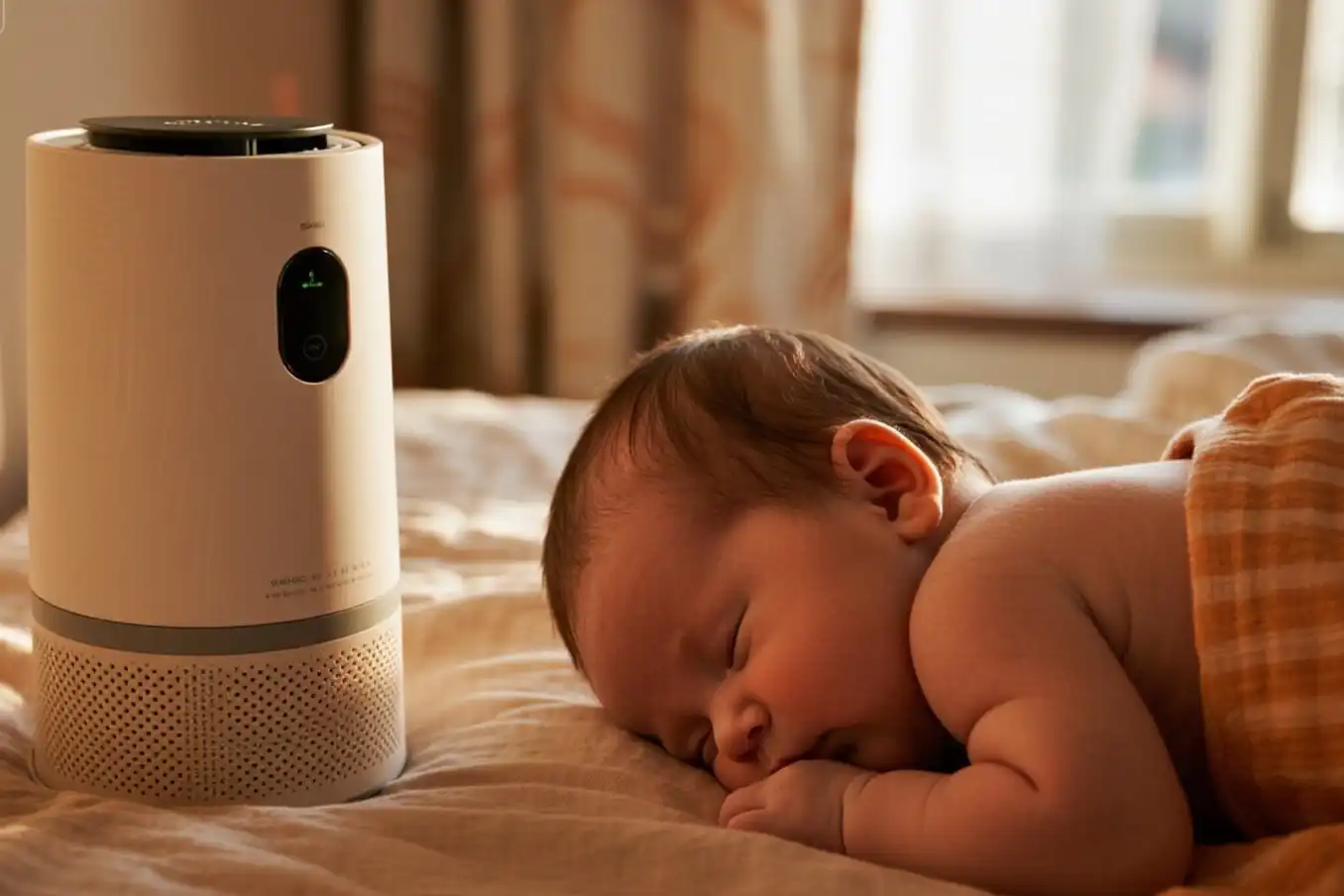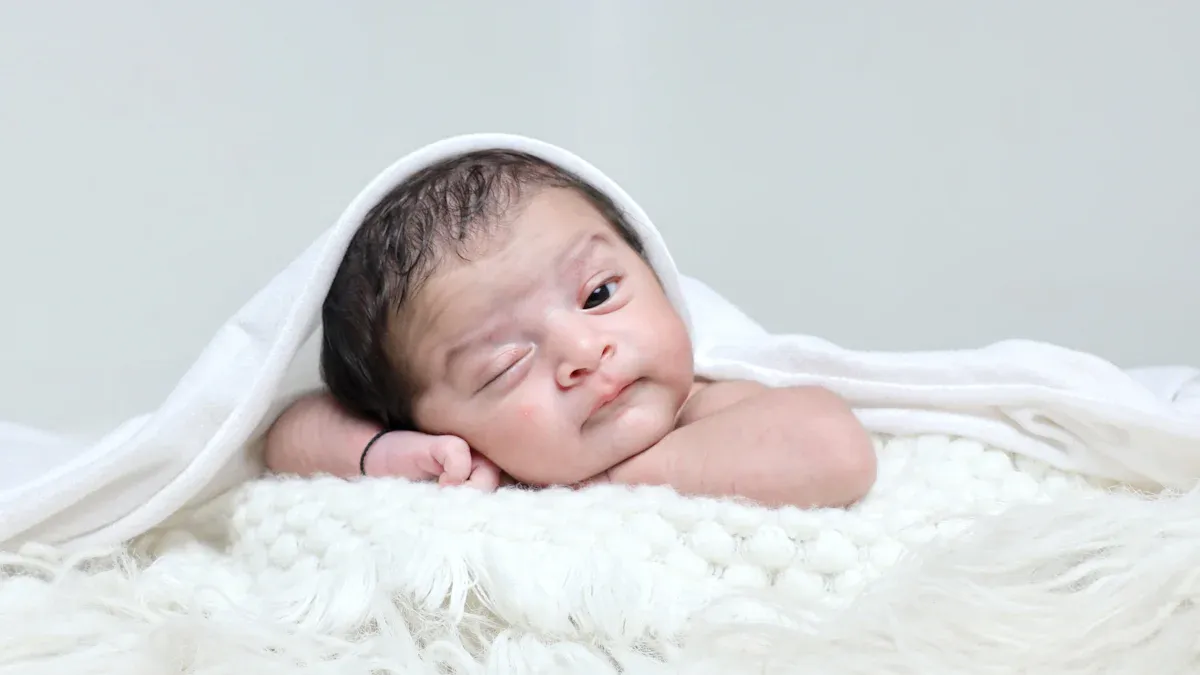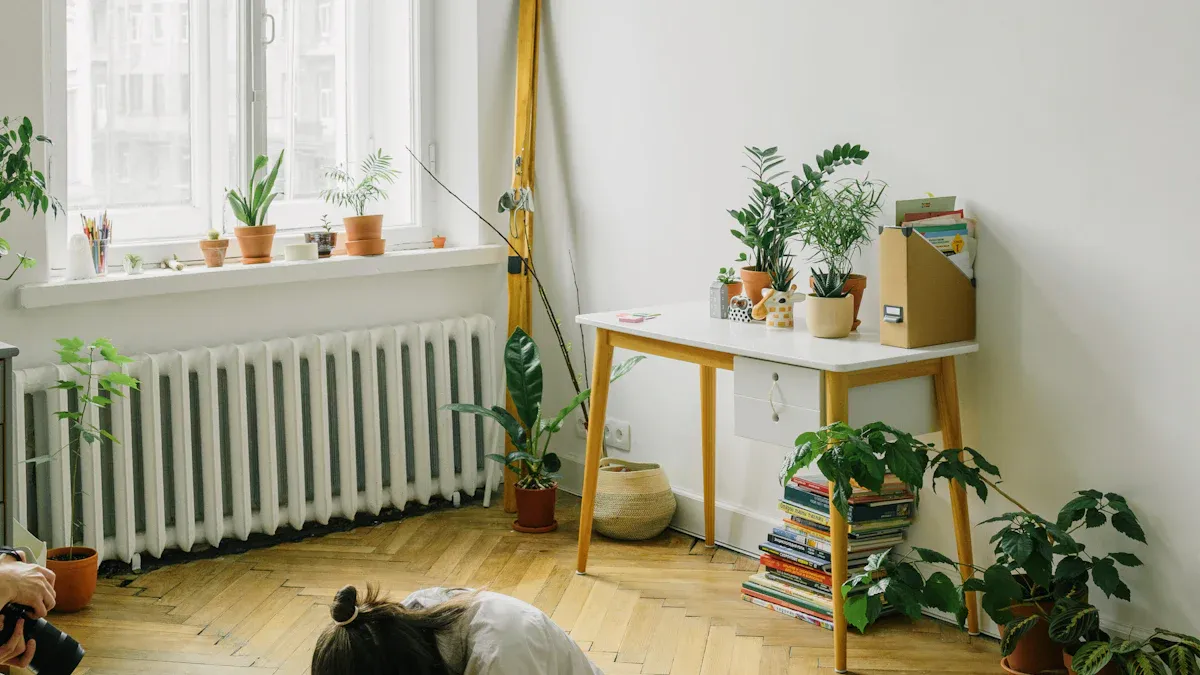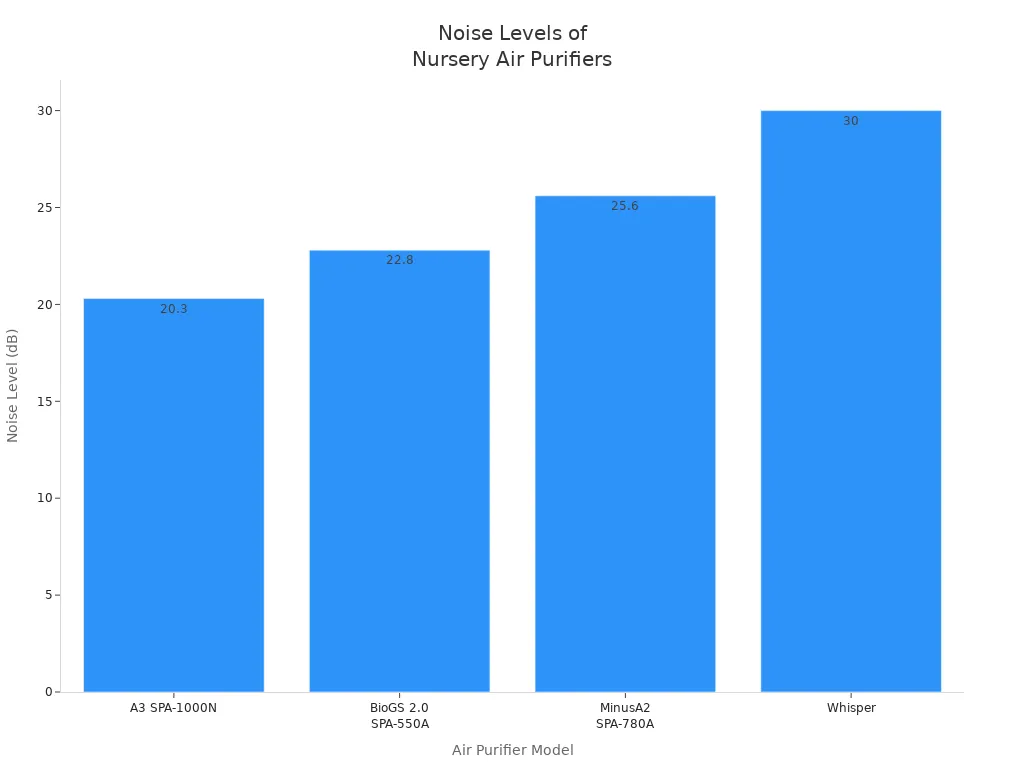
You want your baby’s room to be safe and calm. Many parents worry that an Air Purifier for Infants might wake babies or be unsafe. Doctors and parenting groups say many people have these worries too.
| Parental Concern | Details |
|---|---|
| Safety of air purifiers | True HEPA filters are best; do not use ozone-making purifiers |
| Noise levels | The purifier should be quiet to help babies sleep |
| Maintenance and filter replacement | Clean and change filters often to keep it working well |
| Potential harmful emissions | Stay away from purifiers that make ozone or other bad things |
| Appropriate purifier size | Pick a purifier that fits the size of the room |
| Reliance on purifier alone | Use the purifier with other ways to keep air clean, like dusting |
| Safety features | Choose purifiers with child locks and safety features |
| Cost considerations | Remember you will need to buy new filters often |
You need clear facts about noise and safety. This helps you pick what is best for your family.
Key Takeaways
- Pick an air purifier that is quieter than 50 decibels. Make sure it is quieter than 30 decibels when your baby sleeps. This helps protect your baby’s ears and helps them sleep better.
- Use air purifiers with true HEPA filters. Make sure they do not make ozone. This keeps your baby’s air clean and safe from bad particles.
- Put the purifier a few feet away from the crib. Do not let the air blow right on your baby. Keep cords far from your baby to keep them safe.
- Turn the purifier to a higher setting when your baby is not in the room. Change it to quiet or sleep mode during naps and at night. This helps keep the room calm.
- Clean and change the filters often. This helps the purifier work well and keeps the air fresh and healthy for your baby.
Safety of Air Purifier Noise
Infant Hearing and Sensitivity
You want your baby’s ears to stay safe as they grow. Babies’ ears are very sensitive. Their hearing keeps getting better until they are about two years old. Doctors say noise in a baby’s room should not go over 60 decibels. Hospitals keep noise even lower, around 50 dB, to help babies sleep well and protect their hearing.
Studies show that being around noise above 40 dB for a long time, especially at night, can affect how your baby hears. Some research says too much noise can hurt the cochlea, which helps with hearing. Experts say that steady noise, even if it is not loud, might slow down how babies learn to listen and talk. Try not to let your baby hear loud or steady noise, especially when they sleep.
Tip: A quiet room helps your baby sleep and keeps their hearing healthy.
Immediate Safety Tips
You can do easy things to make sure your air purifier is safe for your baby.
- Choose the right noise level: Pick an air purifier that is quieter than 50 dB. For sleep, try to find one under 30 dB. Most boxes or manuals show the noise level.
- Place the purifier safely:
- Put the purifier on a flat table or shelf.
- Keep it a few feet away from the crib. This stops cold air from blowing on your baby and keeps the room comfy.
- Do not aim the airflow at your baby.
- Secure cords and outlets: Keep cords where your baby cannot reach them. Do not put the purifier near outlets or in the sun.
- Keep the room clean and ventilated: Clean the purifier often so mold and germs do not grow. Open the window sometimes to let in fresh air and stop CO₂ from building up.
- Limit noise exposure: Do not use the highest setting all night. Use a lower setting when your baby sleeps and a higher one when they are awake.
Here is a simple checklist for safe use:
| Safety Step | What to Do |
|---|---|
| Noise Level | Keep under 50 dB, under 30 dB for sleep |
| Placement | A few feet from crib, not blowing on baby |
| Cord Safety | Put cords out of reach |
| Cleaning | Clean the purifier often |
| Ventilation | Let fresh air in the room |
You can find an Air Purifier for Infants that follows these safety tips. Many are very quiet and have child-safe features. If you follow these steps, your baby’s room will be safe and calm.
Noise and Baby Sleep

Sleep Disruption Risks
Noise in your baby’s room can change how well they sleep. Babies need quiet sleep to grow and for their brains to develop. Loud or sudden sounds can wake babies up. These sounds can also make it hard for them to sleep deeply. Hospitals say noise should stay under 45 decibels for babies. If noise is louder, babies may have faster heartbeats. They might breathe quicker and get less oxygen. Babies may also spend less time in deep sleep and wake up more.
Research shows that broken sleep with lots of waking up can hurt learning and growth. Some waking at night is normal and can help the brain. But too many wake-ups can cause problems with thinking and growing. Good sleep is more important than just sleeping a lot of hours.
You might wonder if air purifiers are loud like other things at home. Quiet air purifiers are about 20–26 decibels. This is as soft as a whisper. Talking is much louder, about 60 decibels, and can wake babies up. The chart below shows how air purifier noise compares to other sounds:
| Source/Noise Type | Noise Level (decibels) | Impact on Infant Sleep |
|---|---|---|
| Rabbit Air A3 SPA-1000N (air purifier) | ~20.3 dB | Very quiet, like a whisper, usually not a problem |
| Rabbit Air BioGS 2.0 SPA-550A (air purifier) | ~22.8 dB | Quiet, good for nurseries, can be gentle white noise |
| Rabbit Air MinusA2 SPA-780A (air purifier) | ~25.6 dB | Quiet, low risk of waking baby, can cover other sounds |
| Whisper | ~30 dB | Soft sound, used to show what quiet means |
| Normal Conversation | ~60 dB | Much louder, can wake babies up |
Note: Quiet air purifiers are much less likely to wake your baby than other home noises.
White and Pink Noise Benefits
Some air purifiers do more than clean the air. They also make a soft hum, which can be white or pink noise. White noise has all sound types and can help babies fall asleep faster. Studies show 80% of babies fall asleep in five minutes with white noise. Only 25% fall asleep that fast without it. White noise can block out sudden sounds, like doors or barking dogs, that might wake babies.
Pink noise sounds softer and deeper, like rain or wind. Most studies on pink noise are about adults, but some air purifiers make this sound. Both white and pink noise can help babies feel calm. These sounds are like what babies heard before they were born.
Tip: Keep the noise low. If it is too loud, it can wake babies up instead of helping. Pick an air purifier that stays under 50 decibels, especially at nap time and at night.
You can use an Air Purifier for Infants to give clean air and a soft background sound. This helps your baby sleep better and feel safe.
Choosing an Air Purifier for Infants

Key Features to Consider
When you pick an Air Purifier for Infants, you want to know what is important. Doctors and experts say some features are best for nurseries. These features help keep your baby safe and happy.
- True HEPA filter catches tiny things in the air
- Low noise levels help your baby sleep better
- Child locks and other safety parts
- No bad emissions like ozone
- The right size for your nursery
- Smart features like sensors and auto settings
You should also look for fan speeds you can change and quiet or sleep modes. These let you control how loud the purifier is. Many nursery air purifiers are very quiet, between 15 and 30 decibels on low. This is softer than a whisper and helps your baby rest.
Here is a table that shows how loud some popular models are:
| Air Purifier Model | Noise Level Range (dB) |
|---|---|
| BlueAir 411 | 15 – 38 (user testing) / 17 – 46 (manufacturer) |
| Coway Airmega AP-1512HH | 24.4 (lowest) – 53.8 (loudest) |
| Rabbit Air A3 SPA-1000N | 20.3 |
| Rabbit Air BioGS 2.0 SPA-550A | 22.8 |
| Rabbit Air MinusA2 SPA-780A | 25.6 |
| Whisper | 30 |

Most air purifiers for nurseries are in the low to mid-20s for decibels. This is quiet enough for your baby to sleep.
Fan speeds and sleep modes help you choose between quiet and strong cleaning. Some purifiers have auto mode to check the air and change speed. At night, the purifier can run quietly, sometimes as low as 26 decibels, and still clean the air. This gives you peace and a calm nursery.
Tip: Pick a purifier that fits your room size. This helps it work well and stay quiet.
People who use these purifiers often talk about noise and how well they work. Many parents say using the lowest speed keeps the room quiet. You can use higher speeds when your baby is not there to clean faster. Models like Blueair Blue Pure 311i+ Max and GermGuardian CDAP4500BCA are good at cleaning and staying quiet on low.
HEPA and Ozone Safety
You want to know what makes an Air Purifier for Infants safe for your baby. The most important part is the filter. True HEPA filters remove over 99.97% of things bigger than 0.3 microns. This includes dust, pollen, mold, bacteria, and viruses. HEPA filters use different ways to trap these things, like interception and diffusion. This helps protect your baby from germs and allergens.
Some new filters, like TPA® filters, can catch even smaller things and you can wash them. Washable filters can save you money because you do not need to buy new ones often.
You should not use air purifiers that make ozone. Ozone can hurt your baby’s lungs and breathing. Some ionizers and UV-C purifiers make ozone as a side effect. Always check the product to make sure it does not make ozone or other bad gases.
Safety features are important too. Look for child locks and designs that keep buttons and cords away from your baby. Make sure the purifier does not have sharp edges or small parts that could be a choking risk.
Here is a quick checklist for safety:
| Safety Feature | What to Look For |
|---|---|
| Filter Type | True HEPA or advanced washable filter |
| Ozone Emissions | None (avoid ionizers and UV-C models) |
| Child Safety | Child lock, safe design, secure cords |
| Maintenance | Easy to clean, filter change reminders |
| Room Size | Matches your nursery’s square footage |
Note: Air purifiers should be one part of keeping the air clean. Open windows sometimes and keep the room tidy to help your purifier work better.
When you read reviews, look for what people say about noise and cleaning. Many parents share if the purifier is quiet enough for naps and night. Reviews can also tell you if the purifier is easy to use and take care of.
Picking the right Air Purifier for Infants means looking at noise, filters, safety, and what other parents say. You can find a model that keeps your baby’s room clean and peaceful.
Quiet vs. Effective Operation
Balancing Noise and Air Quality
You may wonder if a quieter air purifier means less clean air for your baby. Most modern air purifiers can clean the air well while staying quiet. Many models work best between 25 and 50 decibels. For a baby’s room, you should look for noise levels below 30 decibels during sleep. This matches the World Health Organization’s advice for background noise in bedrooms. Some advanced purifiers, like the Alen BreatheSmart 45i, can clean the air at just 23 decibels. These levels are softer than a whisper and will not disturb your baby.
High-performance air purifiers often have several fan speeds. The highest setting may reach 50-60 decibels, but you do not need this level all the time. You can use lower speeds at night to keep the room quiet and still get good air cleaning. Large purifiers can clean more air even at low speeds, so they are a good choice for nurseries.
Tip: Choose an Air Purifier for Infants with a sleep or silent mode. This helps you keep the room peaceful and healthy.
Practical Usage Tips
You can use simple strategies to get both quiet and clean air in your baby’s room:
- Run the air purifier on high before bedtime to clean the air quickly.
- Switch to a lower or sleep mode when your baby is sleeping.
- Use smart features like auto mode or air quality sensors. These adjust the fan speed based on the air in the room.
- Place the purifier away from walls and furniture for better airflow.
- Replace filters on time. Dirty filters can make the purifier louder and less effective.
- Keep the nursery clean by dusting and vacuuming often.
- Avoid ozone-producing purifiers for safety.
A table can help you remember these tips:
| Tip | Why It Matters |
|---|---|
| Use high speed when empty | Cleans air fast without noise issues |
| Lower speed during sleep | Keeps room quiet for better sleep |
| Smart/auto mode | Adjusts settings for best results |
| Regular filter changes | Maintains quiet and clean operation |
You can create a calm and healthy nursery by following these steps. An Air Purifier for Infants with the right features will help you balance quiet and effective air cleaning.
You want your baby’s room to be safe and calm. Babies can be bothered by dirty air and loud sounds. Experts say babies are more sensitive to these things than adults. Parents pick purifiers with HEPA filters and quiet fans. Smart features can help too. It is best to get a purifier that is quieter than 30 decibels when your baby sleeps. There are many good choices for nurseries:
| Model | Quiet Operation | HEPA Filter | Parent Approved |
|---|---|---|---|
| Coway Airmega AP-1512HH | ✅ | ✅ | ✅ |
| Levoit LV-H132 | ✅ | ✅ | ✅ |
| Vornadobaby | ✅ | ✅ | ✅ |
Remember: Your baby needs clean air and good sleep to stay healthy.
FAQ
What noise level is safe for a baby’s room?
Experts recommend you keep air purifier noise below 50 decibels. For sleep, choose a model that runs under 30 decibels. This level protects your baby’s hearing and helps them sleep better.
What features make an air purifier safe for infants?
You should look for a true HEPA filter, child lock, and no ozone emissions. Choose a model with a quiet or sleep mode. These features help keep your baby’s room safe and comfortable.
What is the best way to place an air purifier in a nursery?
Place the air purifier a few feet from the crib. Make sure it does not blow air directly on your baby. Keep cords out of reach. This setup keeps your baby safe and the air clean.
What should you avoid when choosing an air purifier for babies?
Avoid purifiers that produce ozone or have loud fans. Stay away from models with small, loose parts. Do not use purifiers without safety certifications. These can harm your baby’s health.
What maintenance does an air purifier need in a baby’s room?
You should clean or replace filters as the manufacturer suggests. Wipe down the unit often. Check for dust buildup. Regular maintenance keeps the purifier working well and the air safe for your baby.
See also
Why Air Purifiers with Remote Control Are Worth It for Families
Air Purifier in Smart Home is today’s must-have
